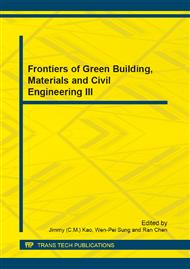p.1901
p.1908
p.1913
p.1917
p.1922
p.1927
p.1931
p.1937
p.1941
Research on the Relational Governance of Construction Project Transaction
Abstract:
Project contract is only one aspect of project governance. Even a perfect contract can not ensure the project performance. The specific characteristics of construction project transaction determines the traditional project governance mechanism that focus on contract alone can not make sure that the construction project goes well. In fact, since construction projects are inserted to certain social environment, the influence of social relationship on project performance draws increasing attention as the research on project governance goes further. The paper applies the idea of relational governance to construction project transaction governance aimed at its specific characteristics and analyses the influential factors of relational governance in construction project transaction from the stakeholders angle and its application exemplified by the partnering pattern.
Info:
Periodical:
Pages:
1922-1926
Citation:
Online since:
August 2013
Authors:
Price:
Сopyright:
© 2013 Trans Tech Publications Ltd. All Rights Reserved
Share:
Citation:


